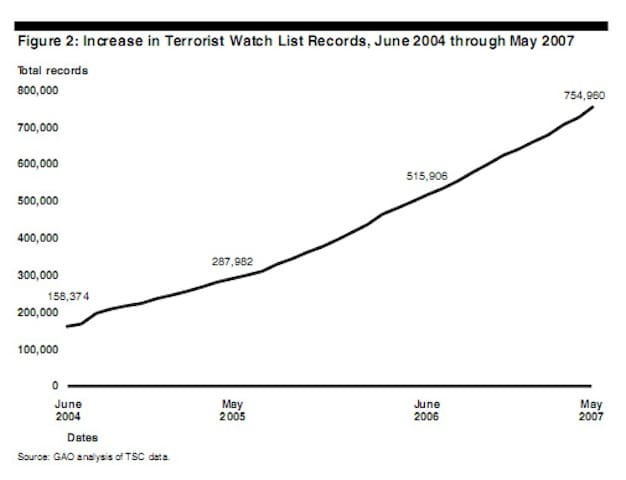The Project of Mayors Against Illegal Guns is calling for the feds to close “the terror gap.” Under current law, individuals on the FBI Terrorist Watch List can legally purchase firearms. “The recent shooting at Fort Hood is the latest tragic example of what’s at stake,” the NYC Mayor Bloomberg-funded group proclaims. “The alleged shooter, Maj. Nidal Malik Hasan, had been under investigation for his potential ties to terrorists – but Hasan passed a federal background check when he later bought a gun. What’s more, FBI counterterrorism officials were not notified when Hasan purchased that gun.” It seems sensible enough, right? Stop terrorists from buying guns. Then again H.R.2159/S.1317 (a.k.a. the Denying Firearms and Explosives to Dangerous Terrorists Act of 2009) raises some troubling questions. For those disinclined to make the jump for a breakdown, riddle me this: even if you agree with the assertion “We need to allow law enforcement to do everything in their power to keep Americans safe,” do you think the feds need more power, without judicial oversight? Here are some other implications those 500 or so mayors [full list here] might want to consider. Or, let’s face it, not.
1. What does “appropriately suspected” mean?
Under the new law,”The Attorney General may deny the transfer of a firearm pursuant to section 922(t)(1)(B)(ii) if the Attorney General determines that the transferee is known (or appropriately suspected) to be or have been engaged in conduct constituting, in preparation for, in aid of, or related to terrorism, or providing material support thereof, and the Attorney General has a reasonable belief that the prospective transferee may use a firearm in connection with terrorism.”
“Appropriately suspected” is not what you might call a vigorous legal safeguard. By the same token, you could drive a SWAT team full of FBI agents through the AG’s “reasonable belief” that a citizen may be aiding and abetting terrorists. There’s only one proper way to do this: a temporary stay on the purchase, followed by an order signed by a federal judge. While the new law allows a citizen denied a firearm permit the right to submit a petition against the government (within 60 days), it’s a case of shutting the barn door before the horse wasn’t bought. Or something like that.
2. Where does the “terrorist with legal guns” problem really lie?
Why weren’t FBI counter-terrorism officials aware of Hasan’s gun purchase? There was nothing whatsoever preventing the FBI’s anti-terror cops from cross-checking Hasan’s appearance on their own National Instant Criminal Background Check System with their own Terrorist Watch List. Nothing save their own bureaucratic incompetence.
Once again, we’re confronted with stark evidence that the federal government is at war with itself, never mind terrorists. In fact, allowing terror watchees to legally buy guns helps law enforcement efforts. It “pings” them that an attack may be imminent. Otherwise (and in any case), terror suspects may simply purchase guns illegally. Which should also alert the FBI. But why do I get the feeling that the anti-terrorist “watchers” aren’t watching suspected terrorist all that closely? Perhaps because they’re over a million of them. [see: below]
3. Has anyone heard of due process?
The vast majority of American are not interested in giving terrorists due process. But there’s a difference between an apprehended terrorist and a suspected terrorist, especially if those under federal scrutiny are American citizens.
According to the ACLU, “In May 2009, the Inspector General of the Justice Department found that 35% of the nominations to the lists were outdated, many people were not removed in a timely manner, and tens of thousands of names were placed on the list without predicate.” In case you didn’t catch that, a 35 percent of over one million suspect suspect names on the FBI terrorist watch list is 350,000 individuals.
Better safe than sorry? Collateral damage? That’s all well and good until a law abiding American discovers that his freedom to travel or purchase a firearm to protect his family has been removed by a government agency that doesn’t have to submit its “findings” to judicial review and makes it difficult for citizens to seek redress.
4. How do you get on—or off—the FBI’s Terrorist Watch List?
Stopping terror suspects from purchasing weapons is all well and good if the process of doing so is transparent and effective. It isn’t. For one thing, there are no published guidelines for the FBI’s selection process. For another, there’s no efficient way to get off the list. Again, our friends at the ACLU:
A September 2009 report by the Inspector General of the Department of Homeland Security found that the process for clearing innocent travelers from the list is a complete mess. The consequences of being mistakenly added to a terror watch list can be more severe than simply missing a plane. Law enforcement routinely run names against the watchlists for matters as mundane as traffic stops, and innocent individuals may be harassed even if they don’t attempt to fly.
Although the ACLU somehow forgot to mention the consequence of not being able to purchase a firearm, that’s where the feds and your local mayor are going with this one. From there, it’s a short step to the feds confiscating legally-owned weapons from citizens on the FBI’s Terrorist Watch List. Even if you’re anti-gun, the prospect of the FBI breaking down your door without a warrant has got to give you pause. Doesn’t it?





Although the ACLU somehow forgot to mention the consequence of not being able to purchase a firearm, that’s where the feds and your local mayor are going with this one “nice”